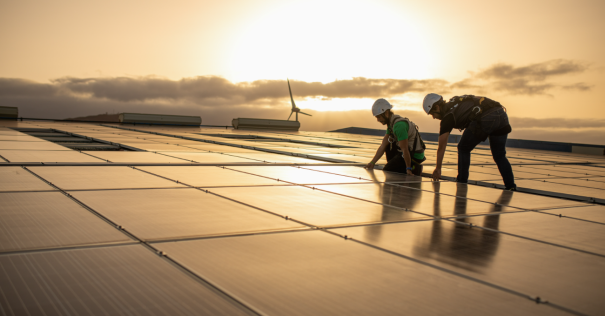Progressive policies are critical to boost the socio-economic benefits of the energy transition and spread them broadly across the world, a new report released by the International Renewable Energy Agency (IRENA) ahead of the UN Climate Conference COP28 in Dubai finds.
Volume 2 of IRENA’s World Energy Transitions Outlook 2023, looks at the socio-economic impacts of the energy transition and shows that the world could witness an average annual increase in GDP of 1.5% by 2050 under the 1.5°C pathway compliant with the Paris Agreement, when compared to the Planned Energy Scenario. The energy transition is also expected to create 40 million additional jobs in the energy sector by 2050, with 18 million more jobs globally in renewables alone.
Volume 1 of the Outlook released earlier this year presented a pathway to achieve the 1.5°C target, positioning electrification and efficiency as key transition drivers, enabled by renewables, clean hydrogen and sustainable biomass. It warned that the energy transition is off-track, demanding urgent and radical action including a tripling of installed renewable energy capacity by 2030.
Today’s report outlines the socio-economic impacts of IRENA’s 1.5°C Scenario. It provides policymakers with insights into how economic activity, employment and human welfare will be affected by 1.5°C and thereby assist governments to design policies that maximise the benefits of the transition.
IRENA Director-General Francesco La Camera said: “I echo the COP28 Presidency’s call for a global renewable energy target as a practical step to implement the Paris Agreement. But policymakers have predominantly concentrated on the technological facets of the energy transition, often overlooking its socio-economic implications.”
He added: “The energy transition holds great promise for boosting the global economy, but we must address persistent inequality. Bridging gaps in climate policy ambition and fostering essential structural changes places unprecedented demands on policymakers. We must facilitate positive transition outcomes while ensuring that these opportunities are equitably distributed across regions and countries.” https://e.infogram.com/6b89161a-41b5-4323-8e56-164f79fcdacb?src=embed
IRENA’s socio-economic analysis finds that the impacts of the transition vary across regions and countries, highlighting disparities in economic development and underscoring the need for inclusive economic strategies.
Although the renewable sector employment is expected to triple by 2050 overall, jobs are unevenly distributed across regions. Asia is expected to hold 55% of global renewable jobs by 2050, followed by Europe at 14% and the Americas at 13%. Only 9% of the jobs would be in Sub-Saharan Africa.

And while Africa’s per capita GDP is set to double, the continent’s resource-rich countries will likely see faster growth, exacerbating regional inequalities. Yet, emerging economies like India and China are poised for significant growth, potentially reshaping the global economic landscape.
Drivers for economic outcomes differ, underscoring the need to proactively support spending in developing countries. For G20 countries investment and trade are the strongest drivers. For developing countries, induced social-directed payments are often the dominant factor in GDP differences.
Connecting the socio-economic and technological facets of the energy transition necessitates policy interventions that transcend merely shifting from fossil fuels to renewables.
IRENA has been consistently calling for a holistic approach to energy transition, intertwining international collaboration, equity, and systemic changes as integral part to this call.
Read World Energy Transitions Outlook 2023: 1.5°C Pathway (volume 1)
Read World Energy Transitions Outlook 2023: 1.5°C Pathway (volume 2)
